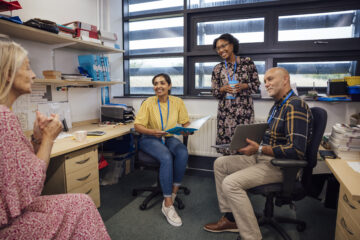In the latest Global Ed Talk with Anthony Mackay, Jal Mehta, professor of education at the Harvard Graduate School of Education and co-author of In Search of Deeper Learning: The Quest to Remake the American High School, discusses what it would take to transform schools. Our current system of schools were designed in the early 20th century industrial era, and Mehta argues that they need to become modern organizations capable of supporting deeper learning for all students.
Mehta suggests that our assumptions and norms about how school works – which he calls “the grammar of schooling” – often gets in the way of effective learning. He says this is particularly true for high school where certain constructs of the school day do not actually serve students or their teachers well. For example, students are organized into groups of 20-30 students per class and move from subject to subject, each only getting a short block of time, with teachers racing through the curriculum in order to prepare students for exams. As Mehta puts it, it is “almost like students and teachers are participating in a play that neither had drafted and neither really wanted to be part of.” He contrasts this with after-school and extracurricular activities like sports, theater and band that operate totally differently. These activities are more flexible, focus on fostering relationships, encourage mentoring and hands-on learning, and therefore feel more purposeful, engaging, and meaningful to students.
Mehta suggests that we might consider rethinking schools to make the organization of the school day more resemble how we organize after-school and extra-curricular activities, which he calls “changing the grammar” from the one we typically use during the school day to the one we use after school. Mehta said he sees skilled, highly engaging teaching happening in U.S. schools but that structures like pacing guides and rigid lesson plans often inhibit effective teaching: “There’s a lot of great stuff going on out there. It’s just that people are working against the grain and the grain should be supporting them.”
The interview concludes with Mehta sharing his ideas about how rethinking the use of time, better preparing teachers, and redesigning curriculum might allow teachers to engage students in deeper learning. Watch the full interview below or listen on iTunes or Spotify.





